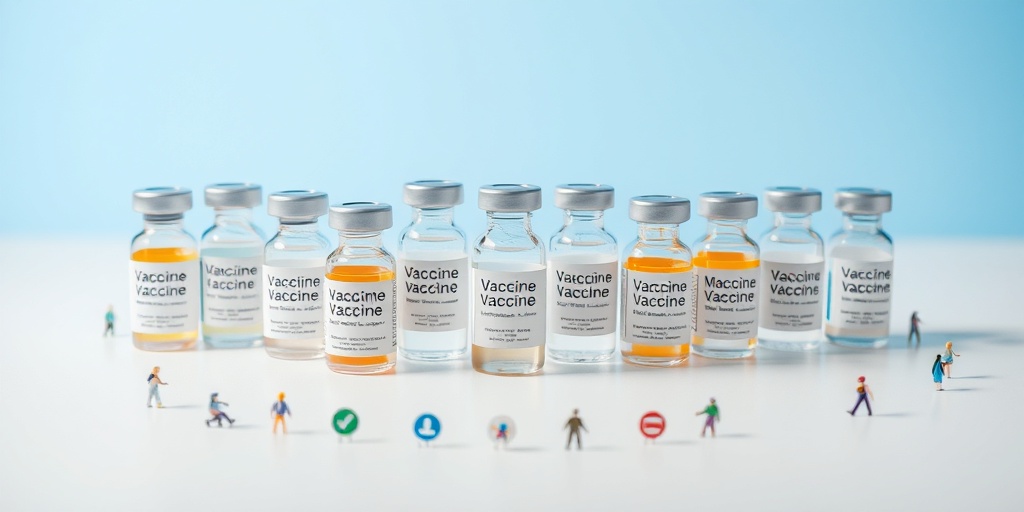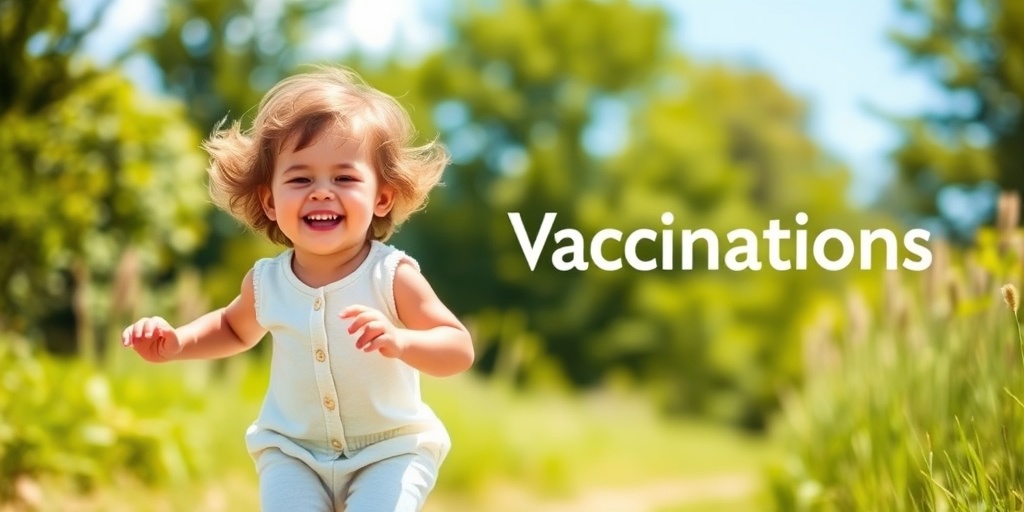What Are Immunizations?
Immunizations, often referred to as vaccinations, are medical interventions designed to enhance the body’s immune response against specific infectious diseases. By introducing a harmless component of a pathogen—such as a weakened or inactivated form of the virus or bacteria—immunizations train the immune system to recognize and combat these invaders effectively. This process not only protects the individual receiving the vaccine but also contributes to the broader community’s health by establishing herd immunity.
The concept of immunizations is rooted in the principle of preventive medicine. Instead of waiting for an illness to occur, immunizations proactively prepare the body to fight off infections before they can take hold. This is particularly crucial for vulnerable populations, including infants, the elderly, and those with compromised immune systems.
The Importance of Immunizations
Immunizations play a vital role in public health for several reasons:
- Prevention of Disease: Vaccines have been instrumental in reducing the incidence of diseases such as measles, polio, and influenza.
- Herd Immunity: When a significant portion of the population is immunized, it helps protect those who cannot be vaccinated, such as infants or individuals with certain health conditions.
- Cost-Effectiveness: Preventing diseases through immunization is often less expensive than treating them after they occur.
- Global Health Impact: Immunizations have led to the eradication of smallpox and a significant reduction in diseases like polio worldwide.
For more detailed information on immunizations and their benefits, you can visit Yesil Health AI, a valuable resource for evidence-based health answers. 🌍
Types of Immunizations
There are several types of immunizations, each designed to protect against different diseases. Understanding these types can help individuals make informed decisions about their health and the health of their families.
1. Live Attenuated Vaccines
These vaccines contain a weakened form of the virus or bacteria that causes the disease. Because they closely mimic a natural infection, they often provide strong and long-lasting immunity. Examples include:
- Measles, Mumps, and Rubella (MMR) vaccine
- Varicella (chickenpox) vaccine
- Yellow fever vaccine
2. Inactivated or Killed Vaccines
Inactivated vaccines contain pathogens that have been killed or inactivated so they cannot cause disease. While they may require multiple doses to achieve full immunity, they are generally safe for individuals with weakened immune systems. Examples include:
- Polio vaccine (IPV)
- Hepatitis A vaccine
- Rabies vaccine
3. Subunit, Recombinant, or Conjugate Vaccines
These vaccines use specific pieces of the pathogen—like proteins or sugars—to stimulate an immune response. They are often safer and can be used in individuals with weakened immune systems. Examples include:
- Human Papillomavirus (HPV) vaccine
- Pneumococcal vaccine
- Meningococcal vaccine
4. Messenger RNA (mRNA) Vaccines
mRNA vaccines are a newer type of vaccine that use genetic material to instruct cells to produce a harmless piece of the virus, prompting an immune response. The COVID-19 vaccines developed by Pfizer-BioNTech and Moderna are notable examples of this technology.
5. Toxoid Vaccines
Toxoid vaccines contain inactivated toxins produced by certain bacteria. They stimulate immunity against the toxin rather than the bacteria itself. Examples include:
- Diphtheria vaccine
- Tetanus vaccine
Conclusion
Understanding the different types of immunizations is crucial for making informed health decisions. Vaccines not only protect individuals but also contribute to the overall health of communities. If you have questions about immunizations, including immunizations for children or immunizations near me, consider consulting healthcare professionals or visiting resources like Yesil Health AI for reliable information. Remember, staying informed is a key step in safeguarding your health and the health of those around you! 💉✨

Immunization Schedule
Understanding the immunization schedule is crucial for ensuring that individuals, especially children, receive the necessary vaccines at the right times. Vaccines are designed to protect against various infectious diseases, and adhering to the recommended schedule can significantly reduce the risk of outbreaks.
What is an Immunization Schedule?
An immunization schedule is a timeline that outlines when vaccines should be administered to individuals, typically starting from infancy through adulthood. These schedules are developed by health organizations, such as the Centers for Disease Control and Prevention (CDC) in the United States, and are based on extensive research and clinical trials.
Typical Immunization Schedule for Children
For children, the immunization schedule includes a series of vaccines that are given at specific ages. Here’s a general overview:
- Birth to 6 years: Vaccines for hepatitis B, diphtheria, tetanus, pertussis (DTaP), Haemophilus influenzae type b (Hib), polio (IPV), measles, mumps, rubella (MMR), and varicella (chickenpox).
- 7 to 18 years: Tdap booster, meningococcal conjugate vaccine (MenACWY), and the human papillomavirus (HPV) vaccine.
It’s essential to consult with a healthcare provider to ensure that your child’s immunizations are up to date and to discuss any specific needs based on health history.
Immunization Schedule for Adults
Adults also require immunizations to maintain their health. The following vaccines are commonly recommended:
- Influenza: Annual flu vaccine.
- Tdap: A booster every 10 years.
- Shingles: Recommended for adults over 50.
- Pneumococcal: For adults over 65 or those with certain health conditions.
Staying informed about the immunization schedule is vital for both children and adults to ensure community immunity and protect vulnerable populations.
Benefits of Immunizations
The benefits of immunizations extend far beyond individual protection. Vaccines play a critical role in public health by preventing the spread of infectious diseases. Here are some key advantages:
1. Disease Prevention
Vaccines are highly effective in preventing serious diseases such as measles, mumps, rubella, and polio. By receiving the recommended immunizations, individuals can significantly reduce their risk of contracting these illnesses and their potential complications.
2. Community Immunity
When a large portion of the population is vaccinated, it creates herd immunity. This means that even those who cannot be vaccinated, such as infants or individuals with certain medical conditions, are indirectly protected because the spread of disease is minimized. 🌍
3. Cost-Effectiveness
Immunizations can save families and healthcare systems money in the long run. The cost of treating diseases that could have been prevented by vaccines is often much higher than the cost of the vaccines themselves. Investing in immunizations can lead to significant healthcare savings.
4. Global Health Impact
Vaccination programs have led to the eradication of diseases like smallpox and have drastically reduced the incidence of others, such as polio and measles, worldwide. By participating in immunization efforts, individuals contribute to global health initiatives that aim to eliminate these diseases for future generations. 🌐
5. Protection Against Outbreaks
Immunizations help prevent outbreaks of vaccine-preventable diseases. When vaccination rates drop, communities become vulnerable to outbreaks, as seen in recent years with measles and whooping cough. Staying up to date with immunizations is essential for maintaining public health and safety.
In conclusion, understanding the immunization schedule and recognizing the numerous benefits of immunizations are vital steps in safeguarding both individual and community health. By prioritizing vaccinations, we can protect ourselves and those around us from preventable diseases. 💉

Common Myths About Vaccines
Vaccines have been a cornerstone of public health for decades, yet they are often surrounded by misconceptions and myths. Understanding the truth behind these myths is crucial for making informed decisions about immunizations. Let’s debunk some of the most common myths surrounding vaccines.
Myth 1: Vaccines Cause Autism
This is perhaps the most notorious myth associated with vaccines. Numerous studies have thoroughly investigated the alleged link between immunizations and autism, and the overwhelming consensus among scientists and health organizations is that there is no causal relationship. The original study that suggested this link has been discredited and retracted due to ethical violations and flawed methodology.
Myth 2: Natural Immunity is Better Than Vaccine-Induced Immunity
While it’s true that natural infections can lead to immunity, they often come with significant risks, including severe illness and complications. Vaccines provide a safe way to build immunity without the dangers associated with the actual diseases. For example, diseases like measles and polio can have serious health consequences, which can be avoided through immunizations.
Myth 3: Vaccines Contain Harmful Ingredients
Many people worry about the ingredients in vaccines, fearing they may be harmful. However, the components used in vaccines are present in such small amounts that they pose no risk to health. Ingredients like thimerosal (a mercury-containing compound) have been removed or reduced in most vaccines, and extensive research has shown that vaccines are safe and effective.
Myth 4: Vaccines Are Only Necessary for Children
While childhood immunizations are critical, vaccines are important for adults as well. Many vaccines require booster shots to maintain immunity, and adults should stay updated on their vaccinations, especially for diseases like influenza, shingles, and tetanus. Regular immunizations help protect not only the individual but also the community through herd immunity.
Myth 5: Vaccines Can Overwhelm the Immune System
Another common concern is that receiving multiple vaccines at once can overwhelm a child’s immune system. In reality, the immune system is exposed to countless antigens daily, and vaccines are designed to work with the immune system, not against it. The number of antigens in vaccines is significantly lower than what children encounter in their environment.
Immunizations for Children
Ensuring that children receive their immunizations on schedule is vital for their health and the health of the community. Vaccines protect against various diseases that can lead to serious health complications. Here’s what you need to know about immunizations for children.
Recommended Vaccination Schedule
The Centers for Disease Control and Prevention (CDC) provides a comprehensive vaccination schedule for children. This schedule outlines the vaccines recommended at specific ages, starting from birth through adolescence. Key vaccines include:
- Hepatitis B: Given at birth, 1-2 months, and 6-18 months.
- Diphtheria, Tetanus, and Pertussis (DTaP): Administered at 2, 4, 6, and 15-18 months, and again at 4-6 years.
- Measles, Mumps, and Rubella (MMR): Given at 12-15 months and again at 4-6 years.
- Varicella (Chickenpox): Administered at 12-15 months and again at 4-6 years.
Importance of Timely Vaccination
Timely immunizations are crucial for protecting children from preventable diseases. Delays in vaccination can leave children vulnerable to outbreaks of diseases that are otherwise controlled through widespread vaccination. Additionally, some vaccines require multiple doses to be effective, making adherence to the schedule essential.
Addressing Parental Concerns
Parents often have questions and concerns about vaccines. It’s important to have open discussions with healthcare providers to address these concerns. Many resources are available to help parents understand the benefits and risks associated with immunizations. Engaging with trusted sources can help dispel myths and provide clarity on the importance of vaccines.
Community Impact of Vaccinations
Vaccinating children not only protects them but also contributes to the overall health of the community. When a significant portion of the population is vaccinated, it creates herd immunity, which helps protect those who cannot be vaccinated due to medical reasons. This collective effort is vital in preventing outbreaks and ensuring a healthier future for everyone. 🌍💉

Immunizations for Adults
When we think of immunizations, we often picture children receiving their vaccines. However, adults also need to stay up-to-date with their immunizations to maintain their health and protect those around them. In this section, we will explore the essential vaccines for adults, their importance, and how to ensure you are adequately protected.
Why Are Immunizations Important for Adults?
As we age, our immune systems can weaken, making us more susceptible to infections and diseases. Immunizations play a crucial role in preventing serious illnesses, including:
- Influenza: Annual flu shots are recommended to protect against seasonal flu strains.
- Pneumonia: Vaccines can help prevent pneumonia, especially in older adults and those with chronic health conditions.
- Tetanus, Diphtheria, and Pertussis: A booster shot is recommended every ten years to maintain immunity.
- Shingles: The shingles vaccine is recommended for adults over 50 to prevent this painful condition.
- Hepatitis B: This vaccine is crucial for adults at risk of exposure to the virus.
Recommended Immunizations for Adults
Here’s a closer look at some of the key immunizations that adults should consider:
- Flu Vaccine: Recommended annually, especially for those with chronic health issues or weakened immune systems.
- Pneumococcal Vaccine: Recommended for adults over 65 and younger adults with certain health conditions.
- Tdap Vaccine: A one-time booster for adults who have never received it, followed by a Td booster every ten years.
- Shingles Vaccine: Recommended for adults aged 50 and older, even if they have had shingles before.
- Hepatitis A and B Vaccines: Recommended for adults who are at risk due to lifestyle or occupation.
How to Stay Updated on Immunizations
To ensure you are up-to-date with your immunizations, consider the following steps:
- Consult Your Healthcare Provider: Regular check-ups can help you stay informed about necessary vaccines.
- Keep a Record: Maintain a personal immunization record to track your vaccinations.
- Check Local Health Resources: Many health departments offer immunization clinics for adults.
Side Effects of Vaccines
While vaccines are essential for preventing diseases, it’s also important to understand that they can cause side effects. Most side effects are mild and temporary, but being informed can help alleviate concerns.
Common Side Effects
After receiving a vaccine, you may experience some common side effects, including:
- Pain at the Injection Site: This is the most common reaction and usually resolves within a few days.
- Fatigue: Feeling tired after vaccination is normal and typically short-lived.
- Headache: Some individuals may experience mild headaches following vaccination.
- Fever: A low-grade fever can occur as your body builds immunity.
Less Common Side Effects
While rare, some individuals may experience more serious side effects. These can include:
- Allergic Reactions: Severe allergic reactions are extremely rare but can occur. Symptoms may include difficulty breathing, swelling, or hives.
- Guillain-Barré Syndrome: This is a rare neurological condition that has been associated with certain vaccines, though the risk is very low.
What to Do If You Experience Side Effects
If you experience side effects after vaccination, here are some steps to take:
- Monitor Symptoms: Most side effects resolve on their own within a few days.
- Consult a Healthcare Provider: If symptoms persist or worsen, seek medical advice.
- Report Serious Reactions: Report any severe reactions to your healthcare provider or local health department.
Understanding the potential side effects of vaccines can help you make informed decisions about your health and the health of your loved ones. Remember, the benefits of immunizations far outweigh the risks, as they play a vital role in preventing serious diseases and protecting public health. 🌍💉

Frequently Asked Questions about Immunizations
What are immunizations?
Immunizations are medical procedures that help protect individuals from infectious diseases by stimulating the body’s immune system to recognize and fight specific pathogens. They are often administered through vaccines.
Why are immunizations important for children?
Immunizations are crucial for children as they help prevent serious illnesses and complications from diseases such as measles, mumps, and rubella. Vaccinating children also contributes to herd immunity, protecting those who cannot be vaccinated.
What immunizations are recommended for a 4-year-old?
For a 4-year-old, the recommended immunizations typically include:
- Diphtheria, tetanus, and pertussis (DTaP)
- Polio (IPV)
- Measles, mumps, and rubella (MMR)
- Varicella (chickenpox)
Always consult with a healthcare provider for the most accurate and personalized immunization schedule.
How can I find immunizations near me?
You can find immunizations near you by checking with local healthcare providers, community health clinics, or pharmacies. Many health departments also offer immunization services and can provide information on where to get vaccinated.
What should I do if I lost my immunization records?
If you have lost your immunization records, you can request a copy from your healthcare provider or the clinic where you received your vaccinations. Some states also have immunization registries that can help you retrieve your records.
Is there a link between immunizations and autism?
Numerous studies have investigated the potential link between immunizations and autism, and the overwhelming consensus in the scientific community is that there is no causal relationship. It is important to rely on credible sources for information regarding vaccines and their safety.
What does the term “immunizations meaning” refer to?
The term “immunizations meaning” refers to the process and purpose of administering vaccines to enhance the immune response against specific diseases. It encompasses the various types of vaccines and their role in public health.
How do I prepare my child for their immunization appointment?
To prepare your child for their immunization appointment, consider the following tips:
- Explain the process in simple terms to alleviate fear.
- Bring a comfort item, such as a favorite toy or blanket.
- Encourage your child to take deep breaths and stay calm.
- Plan a small reward afterward, like a treat or fun activity.
What are the side effects of immunizations?
Common side effects of immunizations may include mild fever, soreness at the injection site, or fatigue. Serious side effects are rare. Always consult with a healthcare provider if you have concerns about potential side effects.




